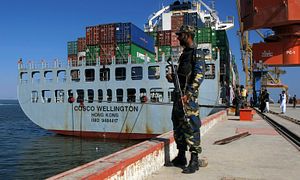Undoubtedly, Gwadar – the port city in Balochistan on the Arabian Sea — is the backbone of the China-Pakistan Economic Corridor (CPEC), which is why it has been in the center of media attention ever since the announcement of the multi-billion dollar project. In this regard, Pakistan’s prosperity is also linked to the development of the Gwadar port project. On some occasions, Pakistani officials have gone as far as to assert that Gwadar has the potential of changing the fate of the whole region.
But on May 12, Baloch militants carried out an assault in the heart of CPEC.
Three armed militants reportedly stormed the luxury Pearl Continental hotel in Gwadar. The attackers were killed, but only after killing five people inside the hotel and a soldier.
CPEC is part of China’s massive Belt and Road Initiative. It seeks to link China’s western and less-developed Xinjiang region with Gwadar in Pakistan’s Balochistan province. This plan will give China valuable access to the Arabian Sea.
From the beginning, China has been concerned about the threats to CPEC in Pakistan in general and in Balochistan in particular. The southern Pakistani province is home to a long-running insurgency by various Baloch ethnic militias aiming for independence. To address China’s concerns, Pakistan has taken action against militant groups, including banned religious outfits. Over the years, the Pakistani authorities have been able to restore peace in many areas that were previously volatile. There have also been reports of Baloch nationalist militants surrendering before the authorities.
But those gains have proven to be short-lived. The May 12 attack in Gwadar was not a one-off; in November 2018 Baloch militants attacked the Chinese consulate in Karachi. Once again, these groups are gaining momentum and are carrying out attacks to show their presence. Clearly, the militants have only been driven underground, not exterminated once and for all.
The brazen nature of May’s attack was notable. Ever since CPEC was unveiled, security has been beefed up in Gwadar. The whole town of Gwadar city now resembles a military cantonment. Foreign journalists visiting Gwadar have not been allowed to enter the port city without “No-Objection Certificates” (NOCs). Locals who visit other areas of Pakistan are regularly asked to show their national identity cards to step back inside their own hometown. Despite these intense security measures, militants were able to attack a luxury hotel in the heart of Gwadar.
The Gwadar incident suggests that Pakistan has not been able to fully address Chinese concerns. Instead, these concerns are further compounding by the day. Pakistani Prime Minister Imran Khan has not been able to satisfy Chinese authorities over CPEC; it doesn’t help that under Khan’s government, there has been talk of renegotiating certain CPEC projects with China. Although those reports were later officially denied, the Chinese were taken aback at the new demands.
China wants CPEC to be successful at any cost. That is why the Chinese have been trying to reach out to some Baloch separatist leaders on their own. Yet those efforts have not borne fruit. On the contrary, things have become even uglier since China’s reported negotiations with Baloch separatists.
Baloch nationalists have shown their hostility toward CPEC from the very beginning. Baloch separatists have posted videos on social media vowing to carry out attacks against CPEC projects. According to them, these development projects are a threat to Baloch identity. In recent months, Baloch separatists have increased attacks in and out of the province. Last month, on April 18, around a dozen armed men killed 14 bus passengers in Ormara, Balochistan, including 11 members of Pakistan’s navy, coast guard, and air force. And as mentioned earlier, last year in November, the the Balochistan Liberation Army (BLA) carried out an assault on Chinese consulate in Karachi, in which two policemen and two civilians were killed.
Besides Baloch nationalists, ordinary Balochs are also apprehensive about the future of Gwadar port project. Many Balochs are concerned that they are going to be outnumbered by a wave of outside migration to the province, as more non-Balochs come hoping to reap the benefits of CPEC. As a whole, Baloch fear that they will lose their identity if they are outnumbered in their own province following the development of Gwadar and completion of CPEC projects in Balochistan. Meanwhile, shockingly, there is a dearth of clean drinking water, electricity, and other facilities for the locals of Gwadar, the epicenter of CPEC.
The government of Pakistan has failed to address these apprehensions. Instead, these fears are only increasing. For instance Gwadar’s local fishermen are being displaced, gradually but noticeably, from their main site of fishing in the name of development. If the government involved locals in the overall development of the Gwadar port project, the Balochs themselves would stand like a wall against any untoward incidents. But instead of getting local buy-in, the authorities are doubling down on militarizing Gwadar. This security-centric approach cannot prevent all attacks, as May 12 proved.
The recent attack on the only five-star hotel in Gwadar – with the explicit goal of targeting foreigners — has raised some serious questions about the security of CPEC. Already, foreign investors, including Chinese, have security concerns about investing in the province. Under these circumstances, the state of Pakistan needs to provide a secure environment to investors, so that they will not shy away from investing in Balochistan in general and in Gwadar in particular. But before doing that, the state must involve the local Balochs in the overall development of the Gwadar and CPEC projects. If not, the situation in Balochistan will continue to deteriorate, which does not augur well for the future of the port town.

































